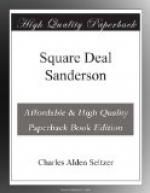It was late in the afternoon when he got to Okar. Barney Owen was with him. The two rode into town, dismounted at a hitching rail in front of a building across the front of which was a sign:
The Okar hotel
Okar was flourishing—as Mary Bransford said. At its northwestern corner the basin widened, spreading between the shoulders of two mountains and meeting a vast stretch of level land that seemed to be endless.
Okar lay at the foot of the mountain that lifted its bald knob at the eastern side of the basin’s mouth. Two glittering lines of steel that came from out of the obscurity of distance eastward skirted Okar’s buildings and passed westward into an obscurity equally distant.
The country around Okar was devoted to cattle. Sanderson’s practiced eye told him that. The rich grassland that spread from Okar’s confines was the force that had brought the town into being, and the railroad would make Okar permanent.
Okar did not look permanent, however. It was of the type of the average cow-town of the western plains—artificial and crude. Its buildings were of frame, hurriedly knocked together, representing the haste of a people in whom the pioneer instinct was strong and compelling—who cared nothing for appearances, but who fought mightily for wealth and progress.
Upon Okar was the stamp of newness, and in its atmosphere was the eagerness and the fervor of commercialism. Okar was the trade mart of a section of country larger than some of the Old World states.
Fringing the hitching rails in front of its buildings were various vehicles—the heavy wagons of Mexican freighters, the light buckboard of the cattleman, and the prairie schooner of the homesteader. Mingling with the vehicles were the cow-ponies of horsemen who had ridden into town on various errands; and in the company corrals were many cattle awaiting shipment.
Sanderson stood beside his horse at the hitching rail for a look at Okar.
There was one street—wide and dust-windrowed, with two narrow board walks skirting it. The buildings—mostly of one story—did not interest Sanderson, for he had seen their kind many times, and his interest centered upon the people.
“Different from Tombstone,” he told Owen as the two entered the hotel. “Tombstone is cattle—Okar is cattle and business. I sort of like cattle better.”
Owen grinned. “Cattle are too slow for some of Okar’s men,” he said. “There’s men here that figure on making a killing every day—financially. Gamblers winning big stakes, supply dealers charging twenty times the value of their stuff; a banker wanting enormous interest on his money; the railroad company gobbling everything in sight—and Silverthorn and Dale framing up to take all the land and the water-rights. See that short, fat man playing cards with the little one at that table?”
He indicated a table near the rear of the barroom, visible through an archway that opened from the room in which a clerk with a thin, narrow face and an alert eye presided at a rough desk.




